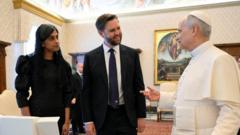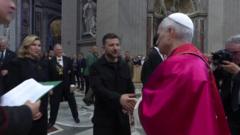In his inaugural Mass, Pope Leo XIV emphasizes support for ordinary people and a commitment to addressing pressing social issues facing the Catholic Church.
Pope Leo XIV's Vision: A Focus on Ordinary People in His First Mass

Pope Leo XIV's Vision: A Focus on Ordinary People in His First Mass
American-born pontiff calls for a missionary outreach focused on healing societal wounds.
During a historic first Mass at the Sistine Chapel, Pope Leo XIV made headlines with a powerful message aimed at supporting “ordinary people” while calling for comprehensive missionary outreach to address the societal ills affecting today’s world. As the first American-born pope, Leo XIV, born Robert Francis Prevost, distinguished himself by advocating for those marginalized by the wealth and influence of the powerful.
Just hours after being elected, Leo XIV presided over a solemn Mass with the cardinals who had elected him, reiterating themes reminiscent of his predecessor, Pope Francis. Highlighting the urgency of restoring faith in communities rife with crises, he lamented the divisions that have arisen from a loss of belief, leading to violations of human dignity globally.
"He positioned himself as a voice for the downtrodden," noted a Vatican spokesperson. The newly elected pope’s words resonated with many, as he acknowledged that combating spiritual disconnection was vital. "In today's world, numerous people consider Christianity as absurd or meant for the weak," he stated.
In his homily, Leo XIV invoked the spirit of Jesus, who found validation among the ordinary yet was sidelined by elites during his time. "Just like Him, we face voices that dismiss us," Leo XIV said, denouncing a plethora of social issues caused by the neglect of marginalized communities.
Facing the challenges of a church defined by opposing ideologies, the newly elected Pope pledged to embark on extensive missionary efforts. The message of outreach was particularly poignant following a period within the church that has grappled with various internal and external pressures, including the need for reforms surrounding the profound crises of faith, family, and dignity.
As he spoke in detail about the role of bishops, Leo XIV emphasized that church leaders must adopt the humble role of missionaries, shifting the focus from authority to service. In a society where many live as de facto atheists, he encouraged humility and an abandonment of self-centeredness to better serve their communities.
Leo XIII, the former pope from whom he derives his name, was known for his dedication to the working class and advocacy for social justice. Similarly, Leo XIV appears committed to continuing this legacy, emphasizing the unification of the church amidst cultural and societal upheavals.
While the path forward is sure to entail facing divisive issues both within the church and the world—ranging from accountability for clerical misconduct to the inclusion of women and L.G.B.T.Q. individuals—his initial commitment indicates a genuine desire to carry the gospel into “enemy territories” where faith is considered secondary to societal pursuits.
As cheers emerged from the gathered cardinals following the Mass, Leo XIV's presence served as a unifying force, extending an invitation to address the complexities of faith with courage and compassion in a world replete with challenges.
Just hours after being elected, Leo XIV presided over a solemn Mass with the cardinals who had elected him, reiterating themes reminiscent of his predecessor, Pope Francis. Highlighting the urgency of restoring faith in communities rife with crises, he lamented the divisions that have arisen from a loss of belief, leading to violations of human dignity globally.
"He positioned himself as a voice for the downtrodden," noted a Vatican spokesperson. The newly elected pope’s words resonated with many, as he acknowledged that combating spiritual disconnection was vital. "In today's world, numerous people consider Christianity as absurd or meant for the weak," he stated.
In his homily, Leo XIV invoked the spirit of Jesus, who found validation among the ordinary yet was sidelined by elites during his time. "Just like Him, we face voices that dismiss us," Leo XIV said, denouncing a plethora of social issues caused by the neglect of marginalized communities.
Facing the challenges of a church defined by opposing ideologies, the newly elected Pope pledged to embark on extensive missionary efforts. The message of outreach was particularly poignant following a period within the church that has grappled with various internal and external pressures, including the need for reforms surrounding the profound crises of faith, family, and dignity.
As he spoke in detail about the role of bishops, Leo XIV emphasized that church leaders must adopt the humble role of missionaries, shifting the focus from authority to service. In a society where many live as de facto atheists, he encouraged humility and an abandonment of self-centeredness to better serve their communities.
Leo XIII, the former pope from whom he derives his name, was known for his dedication to the working class and advocacy for social justice. Similarly, Leo XIV appears committed to continuing this legacy, emphasizing the unification of the church amidst cultural and societal upheavals.
While the path forward is sure to entail facing divisive issues both within the church and the world—ranging from accountability for clerical misconduct to the inclusion of women and L.G.B.T.Q. individuals—his initial commitment indicates a genuine desire to carry the gospel into “enemy territories” where faith is considered secondary to societal pursuits.
As cheers emerged from the gathered cardinals following the Mass, Leo XIV's presence served as a unifying force, extending an invitation to address the complexities of faith with courage and compassion in a world replete with challenges.




















